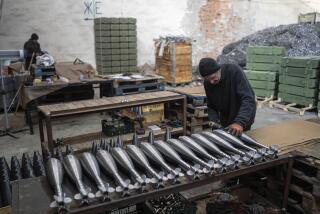NEWS ANALYSIS : High Price of War May End Up Costing Defense Firms Plenty
- Share via
An unlikely casualty of the Persian Gulf War might be the defense industry itself, despite the high marks given to American weapons technology, defense industry executives and analysts say.
The cost of the war effort is potentially so great that they worry that it could deplete defense budgets--long into the future--of money for new weapons purchases.
The outlook for the defense industry was already dismal. And though defense stocks have spurted upward since the fighting began, the war is leading some executives to conclude that things could get even worse.
“Who is going to pay for this war?” asked Ben Rich, a Lockheed Corp. adviser who stepped down earlier this month as chief of the firm’s secret “Skunk Works” aircraft unit. “I am worried about future programs. It is going to hurt future programs, and the ground war hasn’t even started.”
Part of the Pentagon’s planned budget cuts in the 1990s were to come from reductions in military personnel. But the war has sharply reversed that plan--and, in fact, resulted in the mobilization of reserve units. Without those savings, weapons procurement is the only place that can be chopped, if congressional appropriations do not fully offset the cost of the war.
The key issue for the industry is whether the nation can pay the full cost of the war without cutting spending elsewhere.
The Congressional Budget Office has estimated the cost of the Persian Gulf War at up to $50 billion and the General Accounting Office at up to $37 billion, but some estimates run even higher. Such a high cost could well preclude a big post-war spending binge on defense, given the already high federal budget deficit, the economic recession and other fiscal woes.
If such fears are realized, additional tens of thousands of U.S. workers will lose their defense industry jobs--a burden that could be particularly heavy in California. The industry was anticipating a gradual downturn during the 1990s, not a wholesale plunge.
Pentagon budget officials are being tight-lipped, but the information leaking out to the industry has generated extreme concern in many quarters. The Pentagon’s fiscal 1992 budget will be presented to Congress in mid-February, and already industry officials are getting hints about major program cutbacks.
Under the federal budget agreement last year, the cost of the Gulf War is exempt from spending limitations and is to be paid outside the Defense Department budget. But costs are rapidly mounting, and the Bush Administration has yet to request any supplemental funds for the war.
Such a request may, of course, materialize. And defense industry executives could be expected to publicize their fears as a way of influencing the final stages of budget deliberations. But industry officials say that if their worst fears are realized, the consequences could genuinely be severe.
“I am very worried that there will be a very adverse impact on the procurement accounts and eventually the research and development accounts, unless the country decides to have some kind of supplemental budget authorization for Operation Desert Storm,” said General Dynamics Executive Vice President Ralph Hawes. “Procurement is going to get dinged pretty hard.”
A Raytheon executive, who declined to be named, said current budget planning “defies common sense,” adding that earlier projections of 25% cutbacks in weapons programs during the early 1990s are now growing to projections of 50% cutbacks.
“The surgery is to the bone,” he said. “The thing that distresses me is the guys in the services are just rolling over with all their feet in the air. They aren’t even putting up a fight.”
The federal budget agreement left unclear whether the replacement of equipment consumed in the war--as opposed to the day-to-day costs of the fighting--would be paid out of supplemental funds or the regular defense budget. That left open a monumental loophole for political maneuvering.
“In the end, this will be a shell game,” said a staff member of the House Armed Services Committee.
Meanwhile, financial contributions for the war from other nations will not immediately blunt the problem, because those contributions are going into the U.S. Treasury’s general fund rather than the defense accounts.
“I haven’t seen anybody say that the supplemental funding from Japan and Germany is . . . going to be put in the fiscal 1991 defense budget, which is where it is being spent,” said D. Kenneth Richardson, president of Hughes Aircraft. “It would be nice if somebody up there would say, ‘I commit that is what we are going to do.’ Hey, we could all feel better.”
Such concerns were furthered this week when Federal Reserve Board Chairman Alan Greenspan argued to Congress that weapons used to fight the war will not have to be replaced, because the end of the Cold War will reduce future weapons needs. Many in Congress are receptive to such ideas, believing that another war similar to the Gulf War is unlikely.
“We are not the Roman Empire,” said Robert Brauer, special counsel to Rep. Ronald V. Dellums (D-Berkeley).
The budget agreement last year authorized $288.3 billion for the Pentagon in 1991 and $290.9 billion in 1992. But the agreement did not spell out the division of those funds between weapons procurement, research or military operations.
In 1991, the Pentagon is spending $67.2 billion on procurement and $36.1 billion on research and development. Analysts have long anticipated a decline in those two spending categories of several billion dollars. In the wake of the war, some defense executives think, the fall may be two or three times as much.
Not all executives have a gloomy outlook. Richardson said in an interview that he remains optimistic that Congress will make sure that “eventually the right thing will happen.” But he remains concerned that a prolonged conflict could intensify pressures to cut defense spending for military needs outside the war.
Richardson rejects Greenspan’s assertion that the war is simply using up inventory that was due to be reduced.
In most cases, Richardson said, the military is using its best and newest equipment in the war, rather than the older equipment that was due to be retired. If the weapons are not replaced, he says, the military will be stuck with antiquated equipment.
Under prewar plans, for example, the Pentagon was going to cancel production of two Hughes missiles, he said--the Maverick and the Phoenix.
“I would think it would be foolish to shut down the production line for two front-line missiles when we are shooting them right now and they are working extraordinarily well,” Richardson said. “We won’t have enough inventory to have a successful fighting force when this is all over. It is irresponsible to stop them. Right now, the plan is to stop them.”
On Friday, Hughes notified employees at its Tucson plant that the company would be forced to eliminate 1,600 jobs out of the current 5,600 by 1992 because of Pentagon cutbacks.
Investors in defense stocks have cast aside concerns and sharply bid up share prices. Since Jan. 1, the Standard & Poors index of aerospace stocks has increased 3% while the market as a whole is up just 0.6%, said Howard Rubel, a securities analyst at C. J. Lawrence, Morgan Grenfell.
“The stocks are up on war euphoria,” Rubel said.
Some experts are hopeful that the performance of weapons used in the war against Iraq have vindicated the defense industry and that Congress will rush to buy more. The fighting so far seems to show that precision-guided weapons can save American soldiers’ lives and inflict significant damage to an enemy.
But just as poor performance by defense contractors is not always penalized in peace, good performance may not be rewarded in war.
Said Peter Scrivner, an analyst at the American Defense Preparedness Assn.: “I don’t have a sanguine view. Everybody understands that the procurement dollars are not going to be there.”
More to Read
Sign up for Essential California
The most important California stories and recommendations in your inbox every morning.
You may occasionally receive promotional content from the Los Angeles Times.














